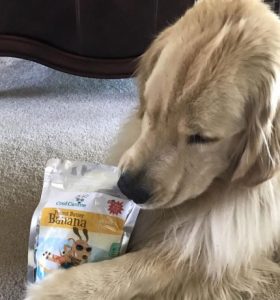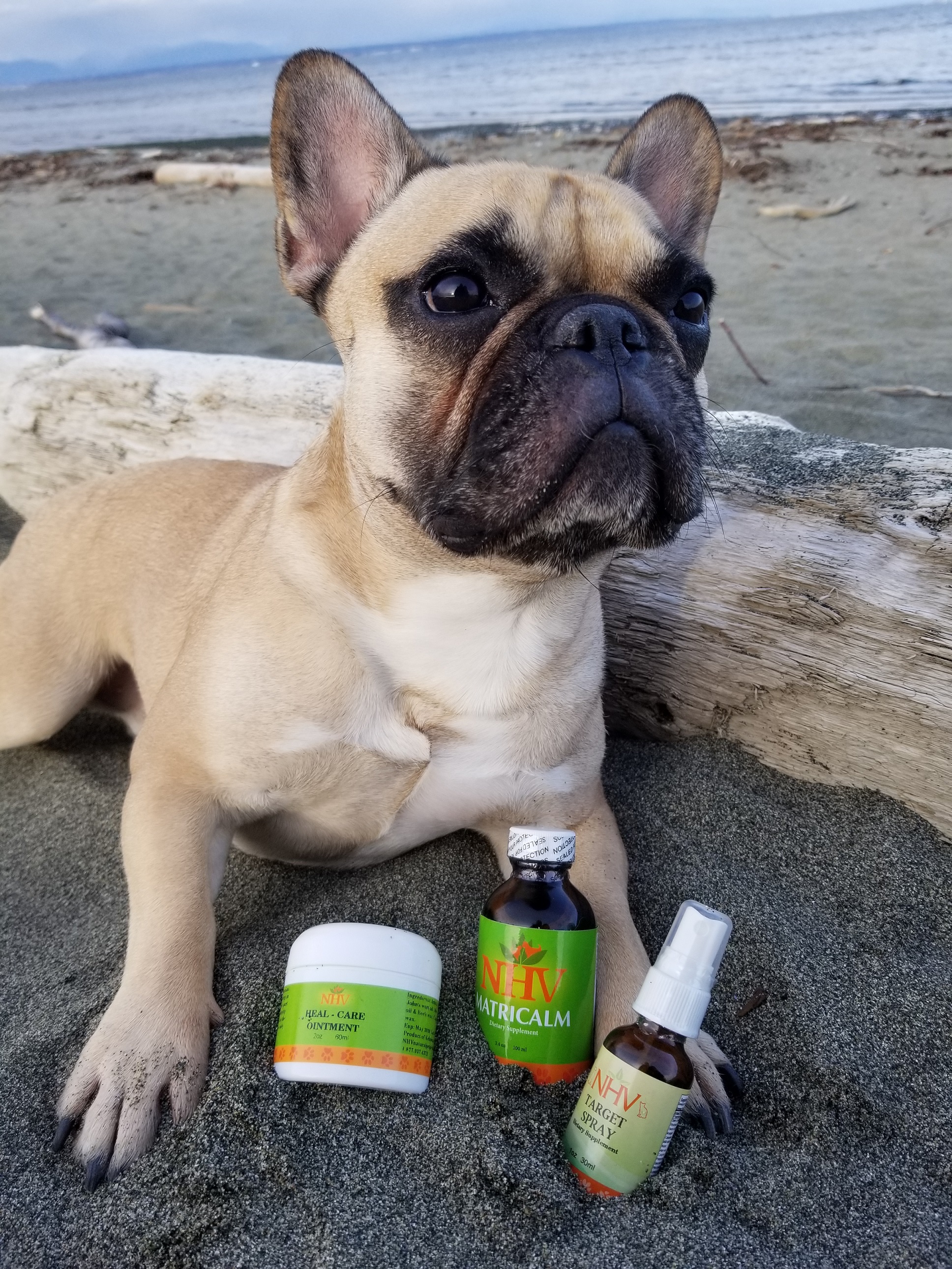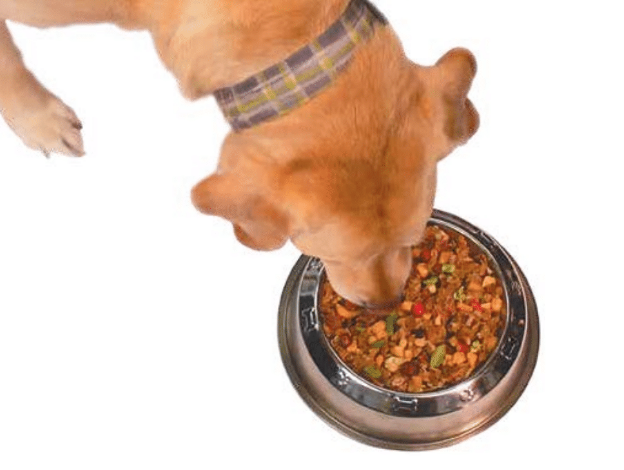Healthy by Design
Pet Age Staff //August 2, 2017//
BY ERIC STENSON
Limited ingredient. All natural. No artificial colors or flavors. While these qualifiers on snack items might be found in the pantry of a person who is watching what he or she eats, these days, one might find these characteristics appearing on chews and treats designed for pets as well.
Down Dog Snacks takes an interesting tack on dog treats. While many producers keep away from grains in products for dogs, Down Dog Snacks produces a strictly vegetarian line for its customer base, according to Jessie Walker, founder and CEO of the Longmont, Colorado-based company.
“Our products are plant-based and grain-free,” she said. “We’re based as much toward humans as much as we are toward dogs. It’s all human-grade, so people can eat them as well.”
Her product names show a flair of creativity, such as Peanut Buddha Bones and Peas, Love & Carrots. She also has Sweet Pawtato Pups, Banana Bliss and AppleBerry Zensations.
“We make all of our own treats,” she said. “You can see peas, blueberries [and] apple sauce in the product. It’s a fun brand.”
Walker is a second-generation producer of pet treats, as her family had a business in New Jersey called Fat Murray’s, named for their beloved “big-boned” basset hound. She has been producing Down Dog Snacks for about 2½ years, deciding not to use the Fat Murray’s name for her own business.
“A fat basset hound just did not take off in Colorado,” she said.
She is now working on a crowdsourcing campaign, with plans to develop a new line.
“We want to be able to fulfill larger orders,” she said.
A Safer Option
Although many people think of dogs as carnivores, Walker maintains that the grain-free, plant-based treats have great relevance, in that she says more dogs are developing allergies to meat products.
And not only are all ingredients human-grade, but Walker notes the company has its two-legged fans as well.
“We have a friend with a 9-year-old, and he loves them,” she said. “We even have to limit him; we tell him he can only have four dog treats.”
Einstein Pets of Sarasota, Florida, also produces plant-based snacks, with chia seed as a primary ingredient.
“We’re an all-natural company,” said Kelly Ison, Einstein’s founder, CEO and co-owner. “It’s the way we manufacture treats that sets us apart. The treats are less dense and have fewer calories. They are great to serve to heavier dogs. The chia seed helps support the coat and teeth, and helps promote a healthy weight.”
Einstein’s treats skew toward the vegetarian as well, with Pumpkin Time, Sweet Potato, Cha Cha Coconut and PB’N Jelly Time joining Turkey Time in the product lineup. Einstein’s has just launched chews as well, which are “grain-free, chewy strips, like jerky,” Ison explained.
Ison’s company was founded in 2012 and now is in 350 different retail stores. She recommends that vendors looking to increase their presence in the natural product arena become as well-informed as they can regarding what’s available to them.
“Take feedback from customers, educate customers,” Ison said. “Start doing research; find out what’s there among natural, all-organic treats. Look for limited ingredients—they have to be aware of what’s going in the product.”
Ison’s primary ingredients in her treats are chia seed and flax seed.
“It’s what’s first on the list. We strictly make treats as an additive to their food,” she said. “It’s to help keep them well. A healthy dog  is a happy dog—and a happy pet parent.”
is a happy dog—and a happy pet parent.”
Homegrown Healthy
Cool Canines of Shell Knob, Missouri, got started in 2013 by founder Kim Przybyl when she began making treats by hand in her own kitchen. Her business gradually expanded by word of mouth, leading to availability in pet and natural food stores throughout Missouri, including recently moving into Whole Foods outlets in the St. Louis area.
“I wanted to make a safe and healthy alternative to products from China,” she said. “Neighbor dogs were our taste-testers in the beginning.”
Cool Canines’ treats come in Peanut Butter Banana, Peanut Butter Pumpkin and Peanut Butter Oatmeal varieties. Przybyl points to the limited ingredients as a factor that sets her company’s treats apart.
“Our treats have no salt, no sugar, and are made with whole wheat, oats, peanut butter, sorghum,” she said. “It’s all human-grade, expensive quality ingredients.”
Her company’s treats also contain Vitamin E, which is added as a natural preservative. The treats are wire-cut, not stamped or extruded by machine.
“People eat them,” Przybyl continued. “The texture, smell, are just like they’re fresh out of the oven but with a greater shelf life. Even pot-bellied pigs like them.”
Many treats and chews take a “meat and potatoes” approach—or at least meat.
OC Raw Dog of Rancho Santa Margarita, California, features treats made for dogs and cats using beef bones, beef knuckle bones, turkey necks, chicken necks, lamb bones and sardines. Barkworthies of Richmond, Virginia, uses pig ears, duck feet and even kangaroos’ ribs and tails.
Primal Pet Foods of San Francisco uses buffalo liver, pork liver, venison, turkey, beef and chicken.
Kyle Frautnick, Primal Pet Foods’ director of marketing, suggests that retailers embrace natural products and learn as much about them as they can to help drive customer traffic.
“Consumers seek alternative products,” Frautnick said. “They’re seeking education and local retailers that carry multiple brands. That will bring success.”
From a retailer perspective, Nancy Bleznak, owner of Medford Pet Supply in Medford, New Jersey, sees natural treats and chews as a burgeoning trend.
“People are being more conscious of chemicals,” she said. “We don’t want to eat processed food. We are more conscious of what we are feeding our animals. We are less fooled by marketing.”
Bleznak stocks a wide variety of natural treats and chews, including products from Orijen and Bag of Bones.
“It’s all about educating the consumer,” she said of how retailers can most thoroughly assist pet owners. “Look for what is really descriptive. See if [manufacturers] are true to what they say they are. Know about the product and the company.”



















